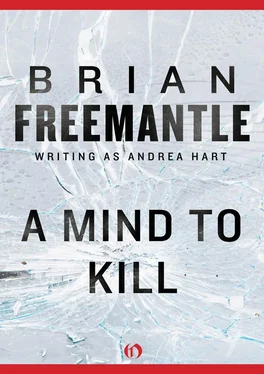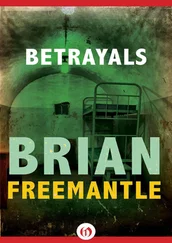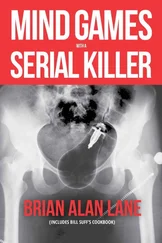Brian Freemantle - A Mind to Kill
Здесь есть возможность читать онлайн «Brian Freemantle - A Mind to Kill» весь текст электронной книги совершенно бесплатно (целиком полную версию без сокращений). В некоторых случаях можно слушать аудио, скачать через торрент в формате fb2 и присутствует краткое содержание. Жанр: Триллер, на английском языке. Описание произведения, (предисловие) а так же отзывы посетителей доступны на портале библиотеки ЛибКат.
- Название:A Mind to Kill
- Автор:
- Жанр:
- Год:неизвестен
- ISBN:нет данных
- Рейтинг книги:3 / 5. Голосов: 1
-
Избранное:Добавить в избранное
- Отзывы:
-
Ваша оценка:
- 60
- 1
- 2
- 3
- 4
- 5
A Mind to Kill: краткое содержание, описание и аннотация
Предлагаем к чтению аннотацию, описание, краткое содержание или предисловие (зависит от того, что написал сам автор книги «A Mind to Kill»). Если вы не нашли необходимую информацию о книге — напишите в комментариях, мы постараемся отыскать её.
A Mind to Kill — читать онлайн бесплатно полную книгу (весь текст) целиком
Ниже представлен текст книги, разбитый по страницам. Система сохранения места последней прочитанной страницы, позволяет с удобством читать онлайн бесплатно книгу «A Mind to Kill», без необходимости каждый раз заново искать на чём Вы остановились. Поставьте закладку, и сможете в любой момент перейти на страницу, на которой закончили чтение.
Интервал:
Закладка:
‘Sure it was her?’ asked Johnson, falling back on well practised legal avoidance of ducking a question by asking another.
‘Course it was her!’ said Emily, indignantly. There was a man by the pool this morning reading about her. There was another picture of lots of people. And there was an M word but it wasn’t mouse. I can read mouse.’
‘It might have been about people being happy that she’s getting better,’ suggested Annabelle, floundering.
Emily looked doubtfully between the two adults. ‘Will she be coming home soon then?’
‘If she gets better.’
‘Will she be nasty to me again?’
‘No,’ said the girl.
‘I don’t want her to be nasty any more. I didn’t like it.’
‘I told you it only happened because she was very ill. Now she’s getting better it can’t happen again.’
‘Good,’ said Emily, brightly. ‘Then everything’s all right. I want to go to the pool again this afternoon.’
While she and Johnson were watching an arm-banded Emily thrash in the shallow end Annabelle said, ‘I’ve just broken a cardinal rule. I’ve told a child a lie that’s bound to be found out.’
Chapter Thirty
The inquest had returned an open verdict, the only one possible from the evidence. And it was unclear from local Hampshire newspaper reports, the only public record available, how much of that evidence had been considered by the coroner, solicitor James Davies, against the prepared statements of witnesses.
Hall read the newspaper reports first, for a general understanding of how deeply Jane’s death had been examined. Gerald Lomax had been the main witness and his evidence made up the major proportion of each account. His wife had suffered diabetes from birth and had always needed to take insulin. She injected herself, usually without any problems, although on two previous occasions, before their move from America to England, there had been two serious overdose incidents. Fortunately there had been people with her on both occasions and doctors had been quickly summoned: on the second she had been admitted to hospital to be stabilized.
In the Hampshire Chronicle, which carried the longest account, the report had been broken here by a series of questions and answers, between the coroner and Lomax.
‘Was your wife careless about her injections?’ the coroner had asked.
‘Sometimes,’ Lomax had replied. ‘She also ate too irregularly for her condition.’
‘What about alcohol, which I understand can contribute to an imbalance?’
‘That had greatly reduced, since our move from America.’
‘You mean she drank immoderately?’
‘Rarely, since our transfer to this country.’
‘But before?’
‘Sometimes.’
‘Would you say your wife was careless of her condition?’
‘I would say she had grown too familiar with it.’
‘Familiarity breeding contempt?’ cliched the coroner.
‘That is so.’
‘Was your wife in any way suicidal because of her condition?’
‘Absolutely not! She loved life.’
‘Did your wife take sleeping pills?’
‘No.’
‘You are aware that some were found. And that traces were found in your wife’s body?’
‘I can’t account for that. The pills were mine. An old prescription. They should have been thrown away.’
It was his working practice usually to spend at least three days a week in London. On the day of her death, a Friday, he had arrived home in mid-afternoon. The house had appeared to be empty, which had surprised him because he had telephoned the previous evening to give her his time of arrival. He had assumed Jane was out, shopping or with friends. He’d actually telephoned a particular acquaintance, the wife of an American on an exchange secondment from IBM, to see if she was there. It was not until an hour after his return that he’d gone upstairs to find his wife in bed, in a coma. He called her doctor at the same time as the ambulance and travelled in it to hospital with her. She’d died an hour after admission.
Police Constable Harry Elroyd testified to being automatically called to the mansion by the ambulance alarm. Mrs Lomax had been in bed, still wearing her nightdress: that and the bedding was soiled, where her bladder had apparently collapsed. On a bedside table he found an insulin pack with four ampoules missing. Two, both empty, were on the table. He’d found the other two, also empty, in the bathroom waste bin. In the bathroom cabinet he had found a half-filled bottle of temazepam sleeping tablets. On the bedside table was a syringe, with a needle still attached. Close to it was a goblet still containing sufficient brandy to be identified by its smell. He’d found a two-thirds-filled bottle of brandy on the downstairs kitchen table, together with the uncleared remains of an evening meal, for one person. There was the residue of red wine in a glass and in the kitchen waste bin an empty Margaux bottle. He had located no note to indicate Mrs Lomax had intended to take her own life.
Dr Allan Greenaway said he had been Mrs Lomax’s physician since her arrival in Hampshire. Considering her diabetes she was a woman in reasonably good health, although she had consulted him about stomach pains. He had prescribed mebeverine hydrochloride, for irritable bowel syndrome, but had feared she might be developing stomach ulcers, not uncommon in her condition. For that he issued repeat prescriptions for the insulin he identified from the pack shown to him. Because of her long history of diabetes he had never thought it necessary to warn her against heavy indulgence in alcohol. It was a precaution of which she would have been permanently aware.
Pathologist Michael Bailey described Jane Lomax as a woman in general good health, apart from some pancreatic atrophy consistent with the history from childhood of her diabetes. His autopsy had also disclosed the evidence of impending ulceration suspected by Dr Green-away, which again resulted from her condition. Her blood sugar level was radically out of balance which would have inevitably caused shock, not just to the virtually inoperative pancreas but to the liver and heart. Forensically that imbalance was caused by an excess of insulin, compounded by alcohol and the lactose and sucrose ingredients of the specific meberevine hydrochloride tablets that had been prescribed. It had been impossible for him to calculate with any accuracy the excess of insulin that had proved fatal. He understood her daily dosage to be twenty units, twice a day. The discarded ampoules represented twice that amount and should not, additionally, have been present during what had evidently been a night-time period. He had found substantial traces of temazepam in Mrs Lomax’s body and agreed with the coroner that a dangerous but common side effect of sleeping pills was for someone to awaken, forget they had already taken some and ingest more.
‘In your opinion, could this have happened in this case and further disorientated Mrs Lomax so that she self-administered a totally unnecessary and lethal injection of insulin?’ the coroner had asked.
‘I consider that the most likely explanation for what happened,’ replied the pathologist. His phrase – a fatal cocktail – had provided the headline in two separate newspapers.
It had also been used – and justified the headline – by James Davies in his summing up, although not part of the quote that appeared. There are many facets of this tragedy for which I cannot find a satisfactory explanation – because of which I feel I am prevented from anything other than an open verdict – but all the evidence before me indicates an unfortunately afflicted woman neglecting, through familiarity, the medical condition with which she had been born. Mr Lomax is a new but already respected member of the local community and to him I express my sympathy in his sad loss.
Читать дальшеИнтервал:
Закладка:
Похожие книги на «A Mind to Kill»
Представляем Вашему вниманию похожие книги на «A Mind to Kill» списком для выбора. Мы отобрали схожую по названию и смыслу литературу в надежде предоставить читателям больше вариантов отыскать новые, интересные, ещё непрочитанные произведения.
Обсуждение, отзывы о книге «A Mind to Kill» и просто собственные мнения читателей. Оставьте ваши комментарии, напишите, что Вы думаете о произведении, его смысле или главных героях. Укажите что конкретно понравилось, а что нет, и почему Вы так считаете.












